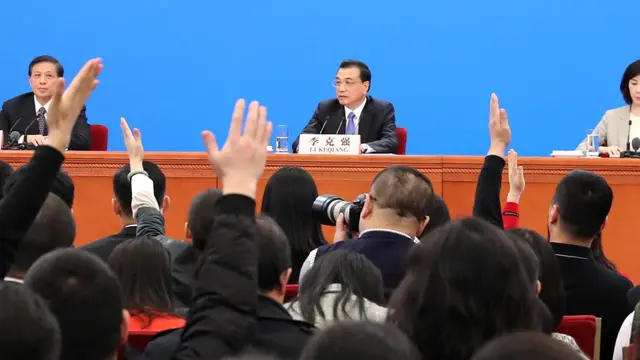Italy's resigned Prime Minister Mario Monti attends a press conference in Rome. Italy, Dec. 23, 2012. (Xinhua)
Italian Prime Minister Silvio Berlusconi reacts during a meeting in Rome, Italy, Feb. 16, 2011. (Xinhua/Wang Qingqin)
Election season is well underway in Italy with the first round of serious name-calling and finger pointing, as worries begin to emerge that Italy's fragile economy might suffer again from the lack of stewardship amid the politicking.
The elections are scheduled to take place from Feb. 24 to 25. But already, Silvio Berlusconi, who resigned as prime minister almost 14 months ago as Italy was on the brink of falling victim to the European debt crisis, took a swipe on Thursday at Mario Monti who took over as the head of a technocrat government, calling his government a "disaster" and Monti himself "distant from reality."
For his part, Monti struck back on the same day, accusing Berlusconi of having "a certain volatility in judgment." Monti also said that Pier Luigi Bersani, the other leading candidate for the prime minister post, should "be brave and silence the conservative part of his coalition a little."
Bersani replied that his party was one that "will never shut anyone up."
"Unfortunately, the election season in Italy means attacks, and now the attacks are coming," said Gianfranco Farina, a political scientist with Rome's Tor Vergata University.
Pollsters show that Bersani is the most likely to win the elections, though it is far too early to count out Monti or even Berlusconi, the three-time premier who is hindered by the highest disapproval levels in the field.
But according to Maria Rossi, co-director of the polling firm Opinioni, Berlusconi's deep pockets and media empire could make him difficult to count out.
"More than half the people in Italy say they will never support Berlusconi as prime minister again," Rossi said. "But if there's one person who can confound expectations, it is Berlusconi."
Monti has his own political liabilities to confront. The former professor and economist had the approval of more than 80 percent of the Italians when he was named prime minister in November 2011, replacing Berlusconi.
But his approval levels have eroded since then. Even though his painful austerity plans have improved investor confidence in Italy and assuaged fears the country could be forced to default on its debt, they meanwhile hurt Italians by raising taxes and cutting back on government services.
But Monti said he needed more time as prime minister to finish the job of righting the economy.
So far, the economy has continued its slow recovery Monti set into motion. Yields on government bonds have remained low, reflecting investor confidence in the country's ability to continue paying its debts.
It is less clear what will happen if the bruising election season becomes even more aggressive.
There is speculation that Monti, who resigned as prime minister on Dec. 21 but who will remain as head of government until the elections, could start to push economic policies that could help to win him support leading to the elections, even if the medium-term consequences are unclear.
Or that his presence in the field, could spark another candidate -- most likely Berlusconi -- to propose even more populist measures in a vote-winning maneuver.
"On one level, these political statements will have an impact on the election, and that is already hard to determine," Farina said.
"On another level, they will have an impact on the day-to-day governance of the country, and that is even harder to predict. What is clear is that while Monti is campaigning and responding to attacks against him he cannot also be governing," he said.
 简体中文
简体中文

